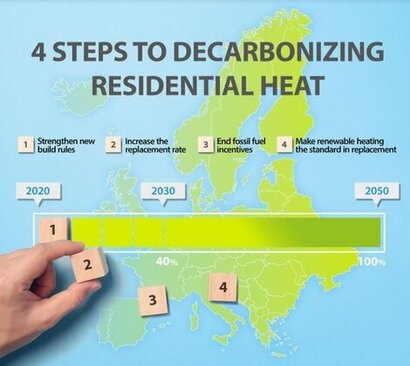
Daikin’s plan aims to decrease CO2 emissions from residential buildings by raising the share of renewable heating and cooling systems to 40 percent by 2030. This is in line with the raised goal of cutting CO2 emissions from 40 percent to 55 percent by 2030, as signed in the European Climate Law on April 21.
The majority of residential housing is still heated with outdated systems, often using polluting fossil fuels such as coal and oil. The European building stock is currently responsible for approximately 36 percent of all CO2 emissions in the EU.
In some European countries, renewable heating via heat pumps has become the new standard in new builds, while the potential they offer calls for more exposure in replacement. This observation contrasts sharply with the raised EU goal of CO2 emission cuts from 40 percent to 55 percent by 2030 in the recently signed European Climate Law.
“A clear and accessible strategy for decarbonising residential heat is needed and renewable technologies are playing an essential role in achieving the new targets, especially in the replacement market” said Patrick Crombez, General Manager Heating and Renewables at Daikin. “Daikin has adopted the ambitious new targets and takes the lead with a 4-step guide to transform residential heating.”
The initial step of this new plan is to strengthen new build rules on energy use. Daikin estimates that heat pumps already currently have up to 50 percent market share in new (single family) houses across Europe. Reinforcement of the current rules must therefore be put in place, to make heat pumps the standard.
The second step is to increase the replacement rate. In order to achieve the objectives of the European Climate Law, the replacement rate must double from 1 percent to 2 percent by 2030. By increasing the replacement rate, old systems are being replaced by more energy-efficient ones, leading naturally to emission cuts. The next challenge is therefore to motivate EU citizens to choose renewable solutions. This involves the need to explain on a wider scale that renewable heating systems, like heat pumps, are an efficient, cost-effective and established solution.
The third step consists of ending fossil fuel incentives. Policy makers should avoid incentives for fossil fuels. Currently, direct or indirect incentives benefit oil or gas-based boilers over heat pumps. They are made cheaper and more accessible, and that’s why renewable technologies also need a level playing field. The gap between today’s electricity and gas prices in many member states is too high to make heat pumps accessible for all EU citizens.
The final step is to make renewable heating the standard in replacement. Daikin believes that heat pumps are the best solution. Indeed, they are increasingly capable of high efficiencies even at lower outdoor temperatures. They are therefore fit for any type of house or apartment. Using renewable energy sources to heat your home reduces the consumption of polluting fossil fuels and CO2 emissions.
Daikin has set itself the ambition to become a carbon-neutral company on a global scale by 2050. The company believes that these four steps are currently the most effective method of decarbonising residential heat and Daikin is calling on all stakeholders to roll up their sleeves and join the movement.
“At Daikin we’re working on a daily basis to help making these 4 steps reality” added Mr Crombez. “Technology is in place, our investments support this. We are making sure our installer community is joining the movement. Heat pumps are the future in the replacement market and it is our duty to convince all stakeholders. All the signs are indicating that we need to act now. Words are no longer enough; clear actions are needed. This is the only way we can make Europe climate neutral by 2050”.
For additional information:

